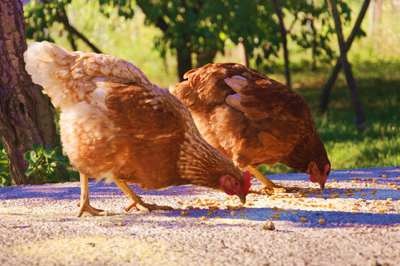The Contrary Farmer

From GENE LOGSDON
I've learned more about the economies of small scale food production from watching chickens than from any library or university. The hens reveal a world almost foreign to our human experience. Ever since farming became a capitalistic enterprise, husbandry has been organized around the idea of making money, not making food. When the farmer is freed from the yoke of money-making, wonderful alternatives become possible in food production. More people can do it, for one thing. It doesn't take a quarter million bucks to get started. If more people do it, eventually the gardeners will become the farmers and the economics of food production will be turned upside down.
It amazes me how, as a farm boy, I learned to raise chickens the money way and thought that was the only way. We lived on a farm that was close to nature, but we were already evolving factory farming. The factory way meant that farmers had to raise lots more chickens in one place than nature ever intended, and the more they raised, the more they had to raise to try to squeeze out a profit. The chickens were penned up, which meant that they had to be provided all their food and water. They developed various diseases in unnatural captivity, started pecking bloody holes in each other, got lice, and suffered from various disorders and diseases that were related to unnatural diets. The ultimate absurdity came when the utility companies instructed us to leave the lights on all night in the coop to make the hens sleep less and lay more eggs.
Now, with only eight hens that are free to roam several acres of woodland, meadow and yard, I never cease to be amazed at how simple nature's way to good fried eggs for breakfast can be. Chickens are amazing omnivores. They will eat anything except citrus rinds. No bug or worm or weed seed is safe from their daily patrol. I follow my little flock around, sometimes on all fours, trying to figure out just what they are pecking at all the time.
First of all, they eat a lot of dirt. Muddy, icy clots of dirt in winter, loamy pinches of humusy soil in the summer. I get right down there beak to beak with them, and I am sure they are eating dirt sometimes, not insects or worm eggs. Or if the latter, they take in a lot of dirt too. Yet over the years, I have never detected any signs that they have internal parasites. How can that be? And they like manure. When I let them out of the coop in the morning, they rush around the barn to where the sheep are gathered and peck in their manure. If I were feeding grain to the sheep, that would be easy to explain because chickens love half-digested grain. But my sheep get no grain. So what are the hens eating? Perhaps the half digested grass, clover and weed seeds that are in the hay?
And oh my, do they love weed seeds. Here is a whole world of unexplored natural food for fowl. Having learned that the seeds of giant ragweed, the scourge of grain farms but a staple food for wild quail, have a 47% crude protein content, higher than any grain we cultivate, I started feeding the golden little seeds to the hens. They gobbled readily. Having learned to open my eyes to the real world, I noticed that the hens also strip the seeds off regular ragweed growing around the coop. They like the fruit of pokeberries which also grow around the coop. The seeds are supposed to be poisonous but no one told the hens. How many myriad other seeds are they eating that I don't know about in my ignorance?
Hens like to graze grass and clover. In winter, during thaws, they will seek out patches of greenish bluegrass and devour it. In the aging livestock manure in the barn they scratch incessantly for fly eggs, which is why we don't have a bad fly problem. They march through the woods like a little army, uncovering worms and bugs out of the leaf litter. They love to raid the compost pile. Their favorite food, if I can judge by their enthusiasm, is table scraps. The older hens know the garbage bucket by sight and when we carry it up to their coop, they are right there at our heels. (Needless to say, natural hens stay healthy into their sixth year, a tremendous savings over having to replace them every year as so often is the case in hen factories.)
I occasionally toss the hens a handful of whole corn or wheat just because I can't quite let go completely from the factory farm mentality I was brought up in. It is good to have grain (but it does not have to be milled grain) when there is snow on the ground. And that's another thing. You don't really have to worry about waterers freezing up if the hens have access to snow. They like snow, sometimes eating it even if water is available. They like to peck on ice crystals too. Nature has been dealing with the real world for eons and eons. Will we ever catch on?
~~

Lovely article! My favorite part was visualizing you "beak to beak" with the chickens. Your birds are blessed to enjoy the natural life.
ReplyDelete